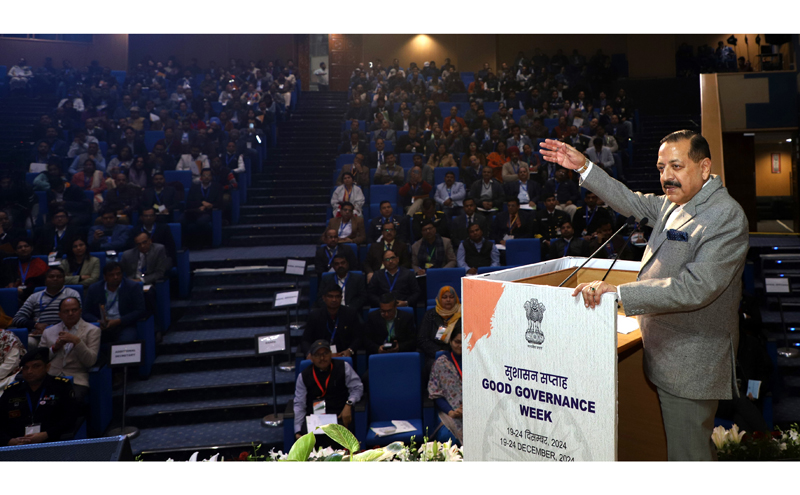Excelsior Correspondent
NEW DELHI, Dec 23: While addressing the National Workshop on “Good Governance,” Union Minister of State (Independent Charge) for Science and Technology; (Independent Charge) Earth Sciences and Minister of State for PMO, Department of Atomic Energy, Department of Space, Personnel, Public Grievances and Pensions, Dr. Jitendra Singh, emphasized the significant shift in work culture since Narendra Modi assumed office as Prime Minister.
During the inaugural event of Good Governance Week, running from December 19 to 25, Dr. Singh acknowledged the “whole-of-government” strategy as a crucial element driving these reforms. This week is particularly significant as it coincides with the centenary celebration of former Prime Minister Atal Bihari Vajpayee, revered for his governance legacy.
Dr. Singh praised the collaborative efforts among various Government departments and ministries, which have enhanced administrative efficiency and social welfare. “The whole-of-government approach has synchronized efforts to implement governance reforms that are effective, inclusive, and impactful,” he stated.
A core part of his address highlighted advancements in waste management and the emphasis on cleanliness, which have emerged as paradigms of economic and environmental sustainability.
The Union Minister praised the Swachhata Campaign, describing it as a groundbreaking initiative that has redefined governance. “More than Rs 2,364 crores were generated in four years through the systematic clearance and monetization of scrap and obsolete materials found in government offices,” he noted. “Governance practices have shifted from merely reducing file journey times and promoting digitalization to creating wealth from waste,” Dr. Jitendra Singh remarked.
He further illustrated the financial success of this initiative by comparing it to the budget of Chandrayaan, India’s lunar mission. “Chandrayaan cost Rs 600 crore, yet we generated four times that amount by monetizing waste resources that had been dormant for years,” he explained. The initiative has also facilitated the clearance of over 643 lakh square feet of office space, presenting opportunities for repurposing these areas.
In his discussion on innovative waste management solutions, the Minister referred to projects transforming household waste into fuel and recycling used cooking oil into biofuel. A pilot project in Dehradun has curtailed harmful reuse practices and boosted recycling efforts. “Every bit of waste represents potential wealth,” he asserted, affirming India’s leadership in the global movement towards a circular economy.
Dr. Jitendra Singh introduced mobile waste conversion vans designed to convert waste into usable resources on-site, minimizing reliance on centralized facilities. “These technologies enhance the accessibility and efficiency of waste management,” he remarked.
Positioning waste management and sustainability at the forefront of India’s economic goals, the Minister stated, “Recycling will fuel the next industrial revolution.” He noted the innovations in biotechnology and material sciences taking place in both governmental and private research institutions, which transform waste into fuel, fertilizers, and raw materials for industry.
Stressing the need to extend good governance principles to the grassroots level, he called for the engagement of districts, panchayats, and local communities. Inspired by the success of the Swachh Bharat Mission, he advocated for increased involvement from civil society. “When governance resonates with the participation of the people, it evolves into a mass movement,” he noted.
Looking towards the future, he announced intentions to more thoroughly integrate public and private sector efforts in upcoming campaigns, indicating that public sector practices could greatly benefit from the efficiency and waste management strategies of the private sector.
During the event, Dr. Jitendra Singh unveiled the assessment report for Special Campaign 4.0, which highlighted notable milestones in advancing cleanliness and efficiency in government offices. The report underscored efforts such as the clearance of thousands of pending files, monetization of scrap materials, and optimization of office spaces. Additionally, the Minister inaugurated an exhibition showcasing “waste to wealth” products developed by various government departments, emphasizing the government’s commitment to sustainability and resource efficiency.
Attendees included prominent figures such as V. Srinivas, Secretary, DARPG; Vandita Kaul, Secretary, Posts; R. Rajagopal, DG(HR), Railway Board; and Arun Singhal, DG, National Archives of India.


Leave a Reply